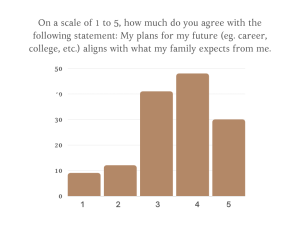Mental Health
April 5, 2023
For many immigrant parents or grandparents that were subjected to harsh standards and expectations based on their country’s culture, they feel the necessity to inflict the same type of pressure on their children and grandchildren– a pressure with severe physical and emotional consequences.
“My parents believed physical punishment was an acceptable form of discipline because it was what they grew up with in Korea,” one student wrote.

This pressure often manifests itself into academic pressure– usually seen through older generations beseeching on younger generations to achieve pristine grades and gain acceptance into elite colleges and universities. Mirroring the acute focus many countries place on scores and examinations, older generations that come from these backgrounds similarly pressure younger generations to have a steadfast focus on academic achievement, often leading to toxic competition to perform well academically, many times at the expense of mental health.
“Especially now, there is a very different mindset regarding the path to college and [its effect] on teenage mental health. I think people are so much more aware of the insanely competitive environment and try to focus on happiness whereas before, people tried to do everything in order to get into top schools. Because of this different mindset, a generational difference exists in the way we look at how students should be performing in the classroom,” wrote one student.
According to the Center for Disease Control (CDC), one in five children, either currently or at some point during their life, have had a seriously debilitating mental illness. Yet, in today’s society, if such an individual were to reach out for help, it is all too likely that they would be met with dismissiveness and even blame.
“[My parents and grandparents] view [mental health] as a first world problem… [it] is something that ‘is a you problem’, that isn’t serious at all and is something that simply makes one weak,” wrote one student. “When I got diagnosed with depression, my parents immediately told me and argued with the doctor that nothing was wrong with me and that I simply just have ‘too many emotions.’”
Growing up, older generations were taught that mental health struggles were a sign of weakness, and to just “get over” their troubles. The taboo on mental health and therapy extends across generations and cultures, but with the recent rise of mental health awareness, it seems that it has finally begun to erode.